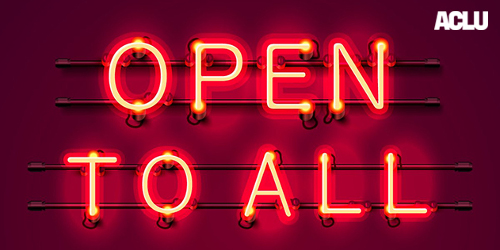BY DREW HOWARD

National business leaders, Congress members and civil rights leaders have raised their voice in support of a same-sex couple who was denied service by a Colorado bakery due to their sexuality.
The ACLU held a teleconference Monday highlighting supporters of the same-sex couple who have filed amicus briefs with the Supreme Court in the Masterpiece Cakeshop v. Colorado Civil Rights Commission case. The list includes more than 35 national business leaders, hundreds of celebrity chefs and restaurateurs, more than 200 members of Congress, leading legal scholars, and the nation's leading LGBT advocacy organizations, among others.
Among the speakers on today's conference call was University of Pennsylvania Law School Professor Tobias Wolff, who argued that anti-discrimination laws are not a violation of free speech.
"Anti-discrimination laws applied to businesses in commercial marketplace have never been found to violate the First Amendment," Wolff said. "When objecting businesses say they don't want to serve people like that [Craig and Mullins], the Supreme Court says you can hold those beliefs. However, when you sell commercial goods you are not engaged in your own acts of expression."
In 2012, Charlie Craig and Dave Mullins visited Masterpiece Cakeshop in Lakewood, Colorado to purchase a cake for their wedding reception. The bakery's owner denied service to the men after discovering they were a couple, saying he only made cakes for heterosexual weddings. The bakery was found to have violated Colorado law after Craig and Mullins filed a complaint with the Colorado Civil Rights Commission. The baker's argument that he has a constitutional right to discriminate against homosexual couples based on religious and free speech grounds was rejected by the Colorado state courts. The case will be brought to the Supreme Court on Dec. 5 where it will hear oral arguments.
Many of today's speakers echoed the idea that this case is about much more than just a cake or a wedding. Iman Jodeh, executive director of Meet the Middle East (Denver), said that an outcome allowing businesses to refuse service to a gay couple could open the doors to even more discrimination.
"It's becoming increasingly easy to replace the bakery with grocery stores, schools, restaurants or any other public service or space, or to replace our gay couple with muslims or jews or DACA students," Jodeh said. "The list goes on, and the reality is that this must stop."
Sarah Warbelow, legal director of the Human Rights Campaign said, "The key message here is businesses that are open to the public should be open to everyone, and should not discriminate based on an individual's identity. While it takes incredible amounts of talent, skill and artistry to prepare food including wedding cakes, it doesn't mean businesses can discriminate. These should be available to anyone able to purchase."
Civil rights leader and Congressman John Lewis also spoke during the teleconference, comparing the struggles of the LGBT community to that of African Americans during the Civil Rights Movement.
"We still have a distance to go," Lewis said. "No American should have to endure the humiliation Craig and Mullins experienced. The world is changing – we cannot and must not and will not roll back."
John Paul Schnapper-Casteras, special counsel for appellate and Supreme Court advocacy with the NAACP Legal Defense Fund, references the Piggie Park case from the '60s when a restaurant owner tried to deny service to three African Americans due to religious beliefs.
"We've been here before. Cases like Piggie Park are stories of progress that should guide the Supreme Court. The wisdom of that court's ruling was accepted and helped moved the country forward, and the same should apply here."
Key Supporters File Amicus Briefs in Masterpiece Cakeshop SCOTUS Case










